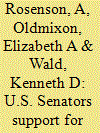| Srl | Item |
| 1 |
ID:
072116


|
|
|
|
|
| Publication |
2006.
|
| Summary/Abstract |
What accounts for individual differences in the level of politicized ethnic identity among members of an ethnonational diaspora? By politicized ethnic identity, we refer to the disposition to assign priority to the interests of the homeland in the politics of the host society. The question presumes that even the most thoroughly mobilized of diasporas contain members who differ among themselves in the degree to which homeland matters predominate in determining political preferences and behavior. Using a 1999 survey of American Jewry, we establish the level of variation in the political salience of Israel to members of the community, then identify and test the factors that promote or retard such commitment.
|
|
|
|
|
|
|
|
|
|
|
|
|
|
|
|
| 2 |
ID:
062098


|
|
|
|
|
| Publication |
Spring/Summer 2005.
|
| Description |
p407-426
|
|
|
|
|
|
|
|
|
|
|
|
|
|
|
|
| 3 |
ID:
087698


|
|
|
|
|
| Publication |
2009.
|
| Summary/Abstract |
This paper explores Senate policy-making toward Israel from 1993-2002. Previous scholarship suggests that congressional policymaking toward Israel is heavily influenced by the ethnic and religious identification of both legislators and their constituents, not simply by legislators' abstract perceptions of the national interest. Other literature de-emphasizes the likelihood that constituent interests will affect Congressional foreign policy making. We test for an impact of both elite and constituent characteristics on Congressional support for Israel, using sponsorship-cosponsorship decisions in the 103rd-107th Congresses. Israel's strongest supporters in this period are shown to be Jewish, conservative, Republican, and evangelical senators. Notably, elite characteristics (partisanship, ideology, and religion) matter more than constituency factors, with the exception of the Jewish population in senators' home states. While Jewish and conservative senators have long been vocal supporters of Israel, evangelical and Republican senators have not historically taken such a strong pro-Israel stance; hence they are relatively new additions to the active pro-Israel coalition. Thus the pro-Israel coalition shows both continuity and change as it has broadened to include new partners. However, we suggest that this coalition is not necessarily stable and may undergo further evolution in the future.
|
|
|
|
|
|
|
|
|
|
|
|
|
|
|
|